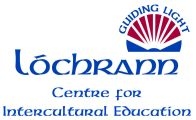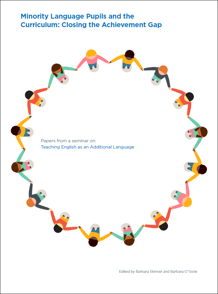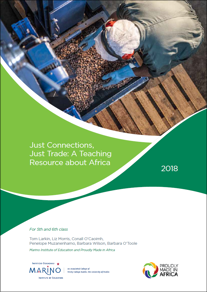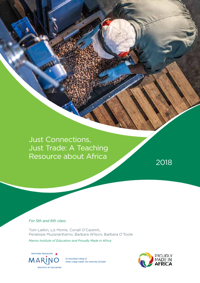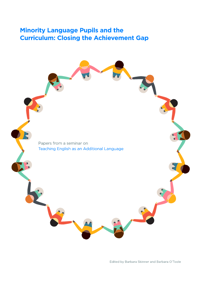Resources and publications
Minority language students and the curriculum: closing the achievement gap
E-book on teaching English as an additional language
Skinner, B. and O'Toole, B. (Eds.) (2018). Minority language pupils and the curriculum: closing the achievement gap. Marino Institute of Education and University of Ulster: E-book.
This 2018 e-publication is based on talks given at two seminars on teaching English as an additional language which were held at MIE and the University of Ulster in Coleraine in 2017, supported by funding from SCoTENS.
The e-book contains chapters by the following authors:
Barbara Skinner (University of Ulster), Barbara O'Toole (MIE), Piet Van Avermaet (Ghent University), Andrew Hancock (University of Edinburgh), Deirdre Kirwan (former principal of Scoil Bhríde Cailiíní, Dublin), Jean Conteh (Leeds University), and Rory Mc Daid (MIE).
Just Connections, Just Trade: A Teaching Resource about Africa (2018/2021)
A collaborative project between Marino Institute of Education and Proudly Made in Africa (PMIA), with funding support from Irish Aid
Just Connections, Just Trade: A Teaching Resource about Africa was written to support 5th and 6th class primary school teachers in teaching about the wider world and in developing global citizenship in relation to curricular areas such as SESE and SPHE. It examines topics such as interdependence and globalisation, trade relationships, and consumer choices, in child-friendly language, and through a range of active and participative methodologies designed to enable children to understand and engage with complex issues. It examines global trade issues while promoting a view of African countries as equal trade and economic partners.
The pack was written by: Tom Larkin, Liz Morris, Conall O'Caoimh, Penelope Muzenenhamo, Barbara Wilson, and Barbara O'Toole. The pack can be downloaded here.
An Irish-language version of the pack is also available: Naisc Chóra, Trádáil Chóir: Acmhainn Teagaisc Faoin Afraic (2021)
Book publication: Challenging perceptions of Africa in Schools: Critical approaches to global justice education
O'Toole, B., Joseph, E. & Nyaluke, D. (2020). (Eds.) Challenging perceptions of Africa in Schools: Critical approaches to global justice education. Oxon: Routledge
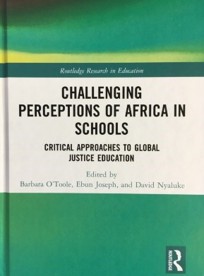
This book challenges educational discourse in relation to teaching about Africa at all levels of the education system in the Global North, with a specific case study focus in the Republic of Ireland. This book will appeal to academics, researchers and post-graduate students in the fields of education and teacher education. It will be of interest to those involved in youth work, as well as intercultural and global citizenship youth trainers.
‘Unsilencing Black Voices’, a documentary produced by Sandrine Uwase Ndahiro and Catherine Osikoya
Lóchrann is pleased to host the following resource:
https://www.unsilencingblackvoices.com/documentary
Read about the work of Sandrine and Catherine here:
Hi, my name is Sandrine Uwase Ndahiro. I am a first-year PhD student studying Contemporary African Literature at the University of Limerick. This project provided me a safe space to embrace my duality of being Black and Irish. Through a creative and educational sphere, I was able to explore and highlight the lived experiences of the Black community in Ireland.
Hi, my name is Catherine Osikoya. I am a fifth year Architecture Student studying at the University of Limerick. This project allowed me to showcase the different types of racism that occurs in Ireland. It enabled me to freely express the racial discrimination that happened to me without the feeling of judgement. Through the medium of documentary, we really hope people engage and be extremely attentive to the experiences shared by the Black and Irish community in Ireland.
How the film came about:
The film was inspired by the Black Lives Matter global movement that had inspired the need to amplify Black voices in Ireland. In Ireland, the conversation about racism erupted as something that had gone overlooked for so long. Now it was taking centre stage. The Black and Irish community across Ireland was now bravely speaking out about their encounters of racism.
Purpose of the film:
The purpose of the documentary is to ensure that we continue the conversation when it comes to the issue of racism. There is a misconception that racism is not something that is embedded within our society. Our documentary debunks this argument as we have showcased the harrowing and traumatic lived experiences that members of the Black and Irish community have endured while living in Ireland.
We hope that by watching our documentary students will be able to actively listen and seek our resources on how to be actively anti-racist but also how to spot when racism is happening to themselves or someone else.
We aim to breakdown this barrier of discussing the topic of race by normalising this conversation within lectures.


